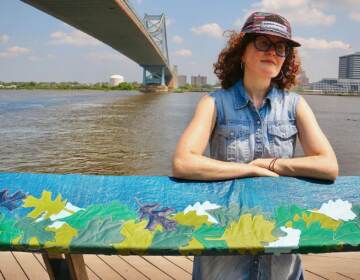Philly filmmakers want to disrupt Hollywood with the first zero-waste feature film
Shot in Fishtown, the film generated just 16 ounces of trash. A typical Hollywood film can produce a million pounds of waste.
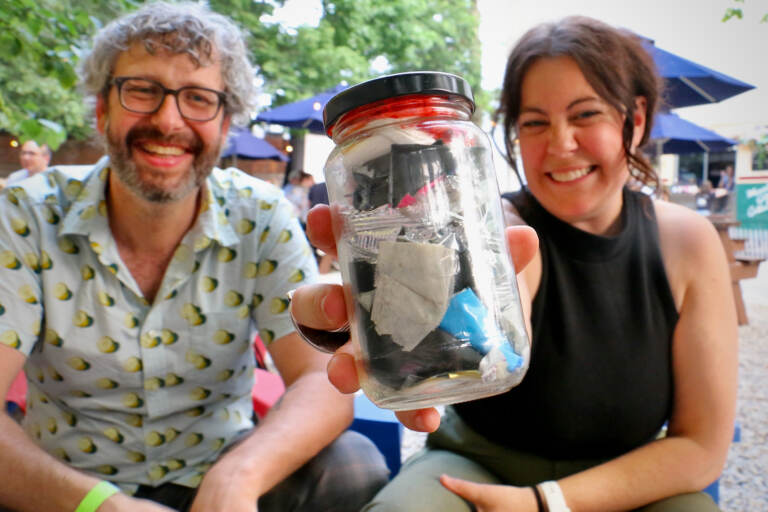
Filmmaker Emily Gallagher holds the jar of waste that was produced during the making of ''Citywide,'' a feature-length film set in Fishtown. She and her husband, Austin Elston (left), partners in Fishtown Films, debuted the movie with a free screening at Mural City Cellars. (Emma Lee/WHYY)
This story is part of the WHYY News Climate Desk, bringing you news and solutions for our changing region.
From the Poconos to the Jersey Shore to the mouth of the Delaware Bay, what do you want to know about climate change? What would you like us to cover? Get in touch.
On a recent Thursday evening, an outdoor beer and wine garden in Fishtown hosted the debut public screening of “Citywide,” a feature film shot in the neighborhood.
As the summer twilight slowly faded to dark, filmmakers Emily Gallagher and Austin Elston stood in front of the gathered crowd to proudly show off their work. But first Gallagher showed them something they are equally proud of: All of the trash generated by the production fit into a 16 ounce pasta sauce jar.
Gallagher holds the glass jar like a trophy.
“We made less than 16 ounces of trash total over the course of three years,” she said. “We’re excited to challenge the Hollywood industry to really look differently at how they make art.”
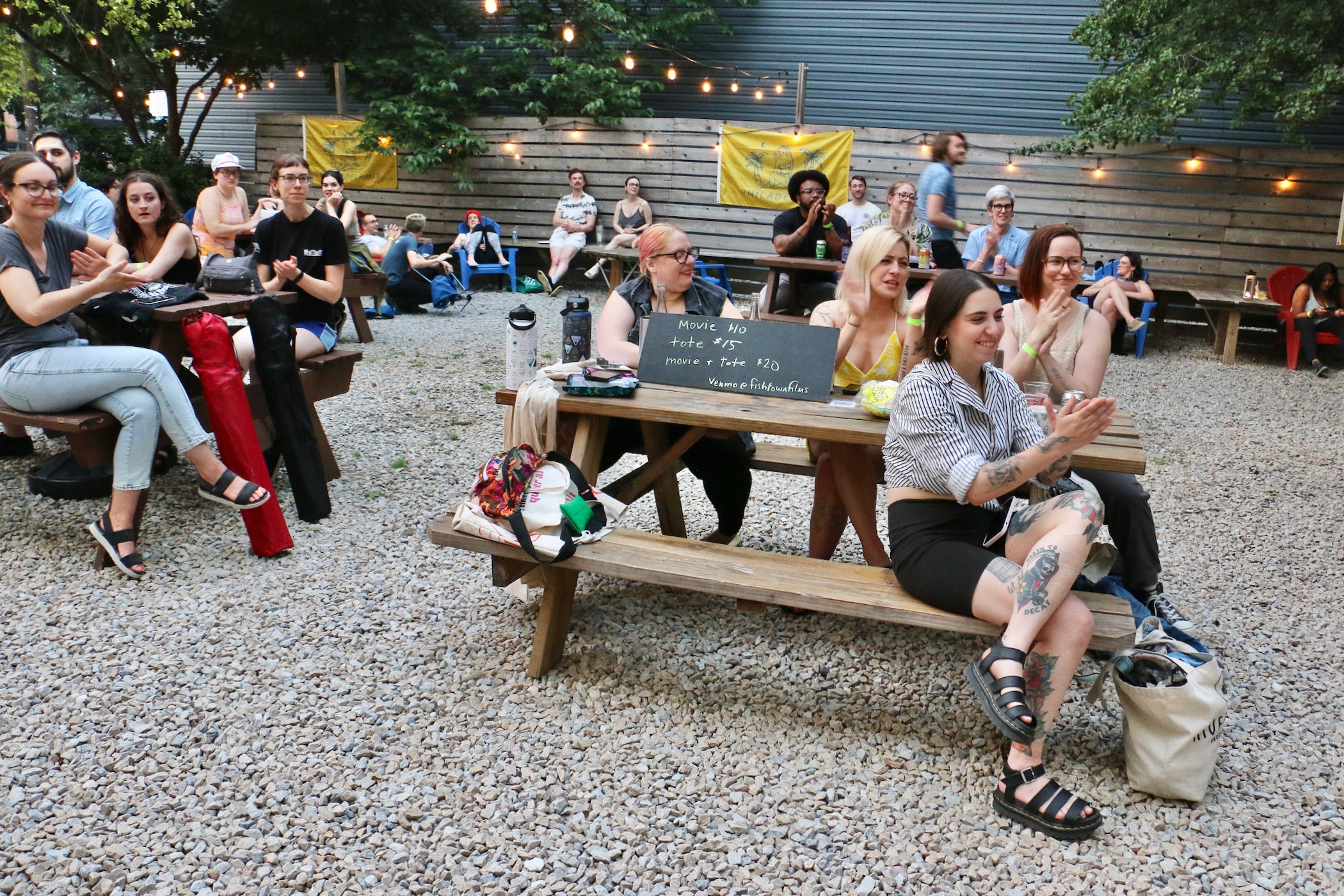
Gallagher and Elston claim “Citywide” is the first zero-waste feature film. It’s a queer, punk rock romantic comedy about a young woman from New York who lands in Fishtown for one night. She attempts to navigate the emotional minefield of its nightlife.That effort includes going to a party, losing her wallet, and falling in love, twice – once with another woman who puts her in the crosshairs of a jealous girl gang hell-bent on giving her a beat down for dating one of their exes.
Elston said his low-budget film shot in 2019 cost less than $75,000. It was inspired by “After Hours,” the 1985 comedy by Martin Scorsese, as well as his own personal experiences in Fishtown.
“The night goes really, really wrong. But it also is a lot of fun,” he said. “If you chase the night, sometimes it becomes chaotic and crazy. It’s a night of stories.”
Filmmaking partners Elston and Gallagher, who are also married to each other, have made a personal commitment to a zero-waste lifestyle and extended that to their filmmaking. They started with a few music videos and short films, ultimately graduating to a feature.
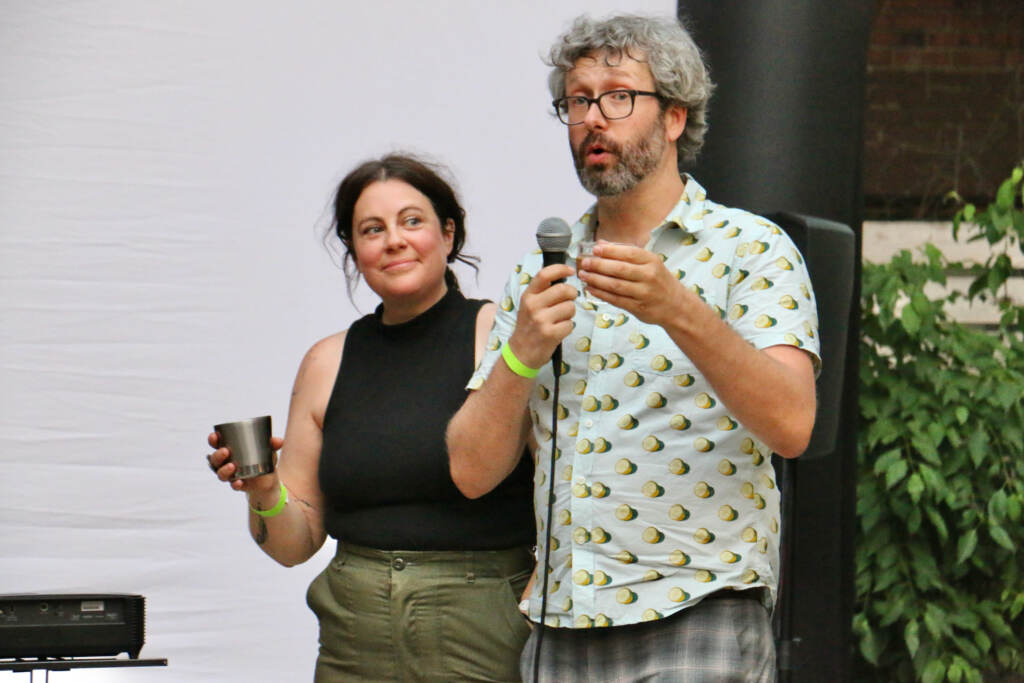
So what’s in that 16 ounce jar that once held tomato sauce?
Gallagher points to some plastic remnants of Polaroid instant film stock given to cast and crew to have fun taking pictures of each other, and a plastic webbed bag in which clementine oranges were packaged and the ubiquitous gaffers tape.
“The worst piece of trash we had is gaff tape,” said Gallagher. “Gaff tape on set is used to tape down wires and make things safe. If somebody wants to design compostable gaff tape, that would be amazing. Just putting it out there.”
Making movies normally produces an enormous amount of trash. A Hollywood feature film can generate 500 tons of waste — that’s about a million pounds for one movie, according to data from an environmental consulting company Earth Angels. A limited series, the kind of thing you might see on Netflix, can generate more than 300 tons.
By comparison, the Department of Streets collects almost 10,000 tons of trash from the entire city of Philadelphia every week.
Adam Rotwitt runs Sun Center Studios, a soundstage outside of Philadelphia that attracts high-end productions like the Rocky spinoff “Creed” and the films of M. Night Shyamalan, which rent the studio for several weeks to several months at a time. Rotwitt says even over those short runs his tenants can generate 20 to 200 tons of trash.
“It’s a lot of building materials, basically, for homes or apartments or hospitals or whatever the set calls for,” he said.
Think of all the police stations, offices, and spaceships you’ve seen on screen: After shooting they are all thrown away. Much of the waste is plastic, which the Environmental Protection Agency regards as the most damaging to the environment, wildlife, and human health.
There are efforts to mitigate trash on film sets. In 2010, the Producers Guild of America created the Green Production Guide with tips on how to reduce waste and energy consumption on film sets. The Philadelphia Film Office offers guides for local productions to work more sustainably, similar to film offices in California and New York.
In the last several years, a tangential industry has emerged of environmental consultants, like Earth Angels, which hires out agents to production sets to help reduce waste by diverting as much as possible toward recycling, composting, or reuse.
“People perceive trash as something secret, something really dirty,” said Tamsin Hollo, an Earth Angels consultant based in the Hudson Valley. “They get up to a zero-waste station that has three different places to put their trash and they start feeling like they’re being tested.”
Hollo said many people on film crews are concerned by the volume of trash, but the pressures of the job force those concerns to the back burner.
“Everything on a film set — time really is money. Things have to move very quickly,” she said. “When you’re asking people to take an extra step and think about things in a different way, the knee-jerk reaction is that they do not have the time to do that.”
Hollo is usually brought into a film at the production stage, which she says is already too late for significantly reducing waste. She said decisions about how to reduce waste need to be made at the pre-production stage, when plans for sourcing materials and diverting waste can be integrated into the shooting schedule.
That’s how Fishtown Films did it. Every step of the production process — from as early as writing the script, casting the actors, and hiring vendors — was made with trash in mind.
“From auditions we made it clear to the actors this was a zero-waste film,” Gallagher said. “Are you willing to take this challenge with us? We couldn’t cast you if you weren’t in.”
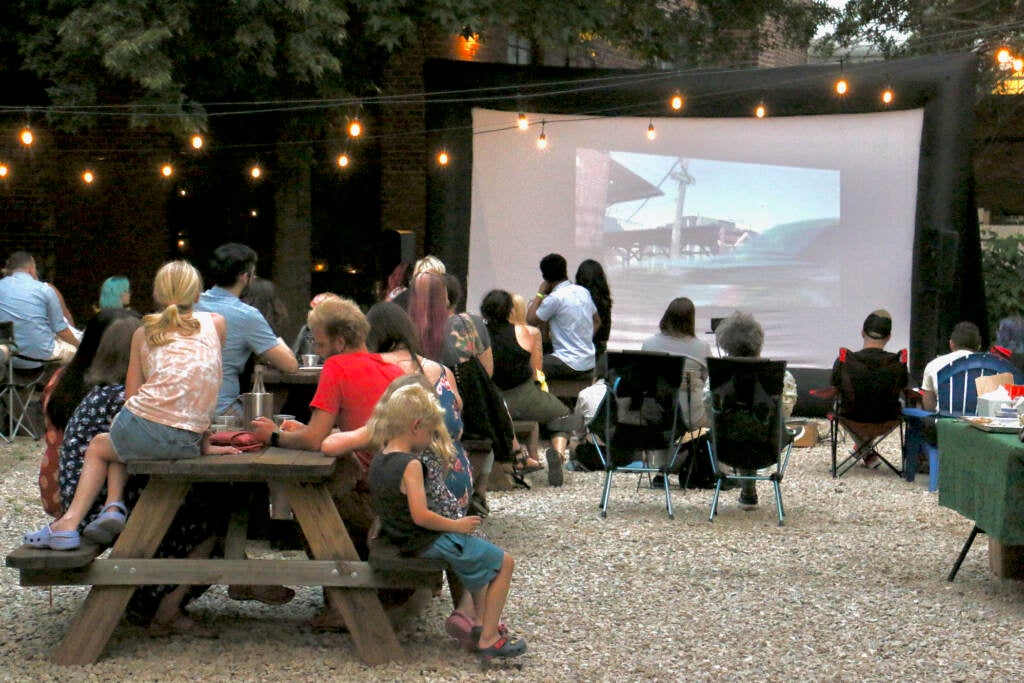
For actress Rachel Lin, who was cast in “Citywide” as one of the members of the menacing girl gang, it was an eye-opening proposal. For example: none of the food on set could have packaging.
“This no packaging around snacks thing, that really limits the kinds of snacks you can have,” Lin said. “You’re like: ‘Can I have a bag of Goldfish?’ It’s, like, ‘No.’”
After Lin wrapped “Citywide,” she got a recurring role on the TV show “Law and Order: Organized Crime,” where she started to see waste everywhere.
“There were more and more things where I was, like, ‘Oh, I didn’t even think about that as being waste,’” she said. “Like costumes, I don’t think about costumes as being something that’s bought and then not used again.”
Large film productions can throw away thousands of costumes after the production wraps. The “Citywide” filmmakers found a costumer who salvaged clothes from thrift stores, altered them, then after the production re-sold them as second-hand.
They also found a caterer who was on board with providing zero-waste craft services. Rachel Klein, who runs a vegan restaurant in South Philadelphia, Miss Rachel’s Pantry, agreed to deliver food on reusable platters instead of in styrofoam or aluminum trays.
“It actually felt really nice because it was like you’re dropping food off at a friend’s house, like: ‘Okay, I’ll get my Tupperware later,’” said Klein. “Sometimes catering pans, they’re unpleasant to look at. You’ll get cut on them. They’ve got sharp edges. They’re just not warm and fuzzy.”

Klein bought cheap platters from thrift stores that had attractive decorative patterns. She never got them back, but said she is perfectly happy letting the filmmakers hold onto the second-hand dishes.
The biggest decision the filmmakers made to reduce waste was using existing locations around Fishtown, which eliminated the need to buy furniture or build sets. But the most time-consuming decision was to eliminate paper plates, napkins, and plastic cutlery. Gallagher said every day after shooting she faced a mountain of dishes and laundry.
“You’re going to spend your time doing something anyway. Is it running to the store to buy more craft services that are packaged and more paper plates and more things to throw away? Or is it doing the dishes and washing the linens and making sure everything is reusable?” she said.
Tamsin Hollo, the environmental consultant, commends Fishtown Films’ zero-waste ambition, but says it does not translate to large-scale Hollywood productions.
“I love what Fishtown Films is doing. I love a small production stuffing their waste into a 16 ounce jar,” she said. “It’s not going to be for every production, because size really does matter. What we are looking at typically in production bins is thousands of costumes. We’re looking at [the] tonnage of building materials. Sometimes these numbers are just overwhelming. You could build a house with what we’re reclaiming from these sets.”
Elston’s advice for going zero-waste? Don’t be a hero. Just do what you can do.
“Don’t overwhelm yourself. If you fail you’re just going to feel awful,” he said. “That’s not the point of doing this. There’s enough to make you feel awful. Why make your fun that way?”
“Citywide” is currently available for online streaming on Amazon.

Get daily updates from WHYY News!
WHYY is your source for fact-based, in-depth journalism and information. As a nonprofit organization, we rely on financial support from readers like you. Please give today.




